45+ Sample Mediation Agreements
-
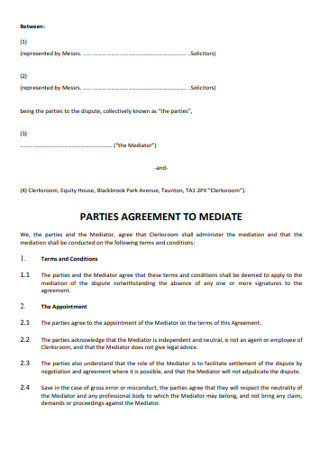
Parties Meditation Agreement
download now -
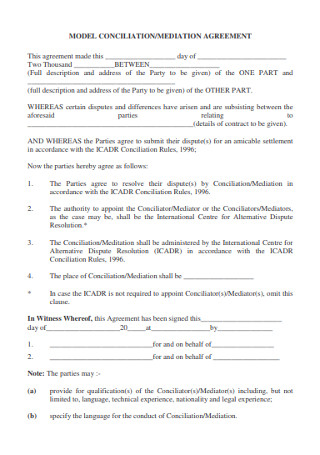
Model Consolation Meditation Agreement
download now -
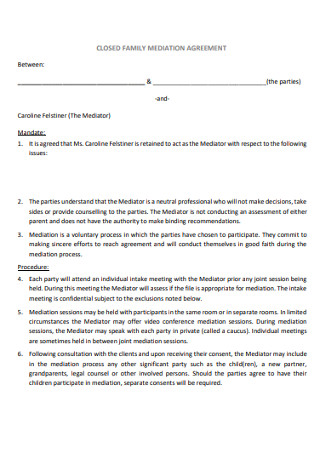
Closed Family Meditation Agreement
download now -
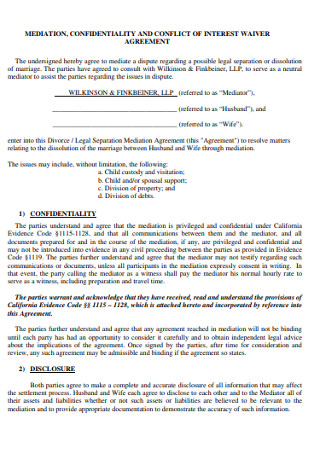
Confidentiality Mediation Agreement
download now -
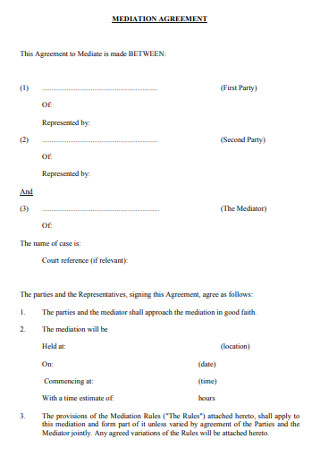
Sample Mediation Agreement
download now -
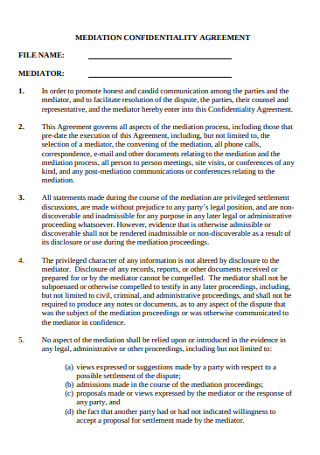
Sample Mediation Confidentiality Agreement
download now -
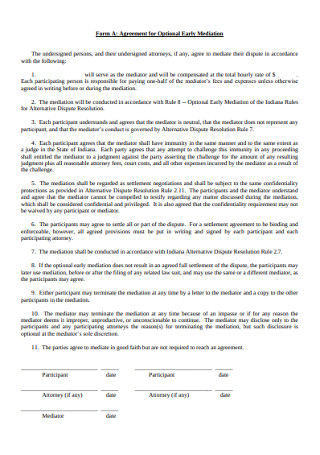
Agreement for Optional Early Mediation
download now -
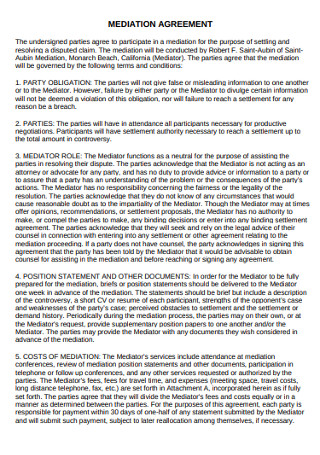
Basic Mediation Agreement
download now -
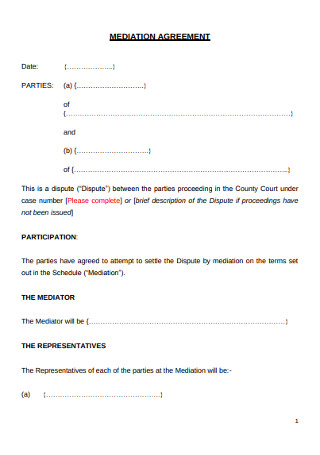
Standard Mediation Agreement
download now -
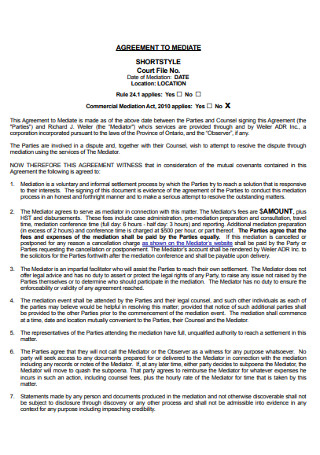
Mediation Short Style Agreement
download now -
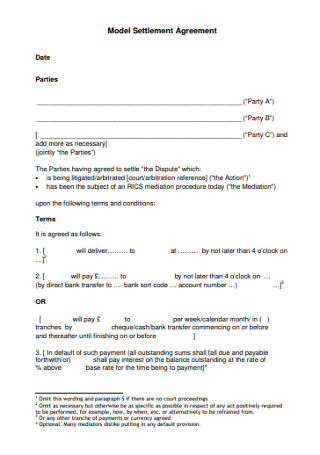
Model Settlement Mediation Agreement
download now -
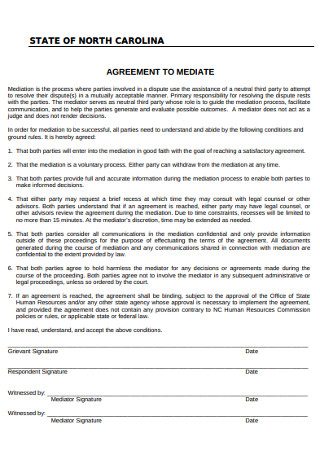
State Mediation Agreement
download now -
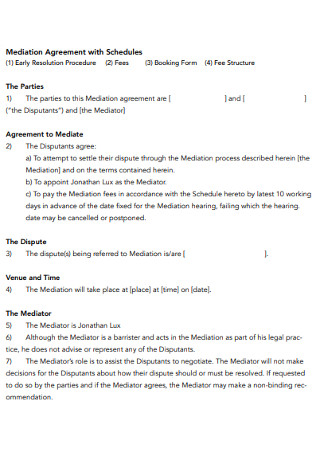
Mediation Agreement with Schedules
download now -
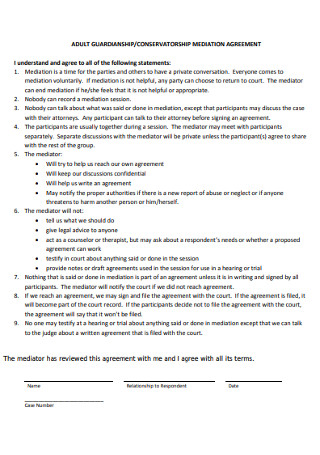
Conservator-ship Mediation Agreement
download now -
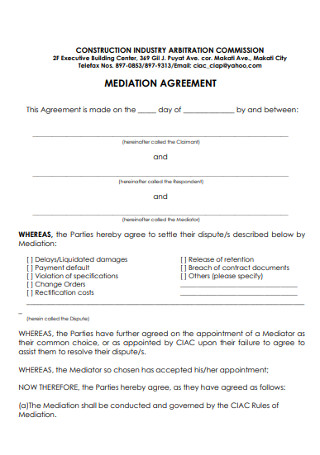
Construction Mediation Agreement
download now -
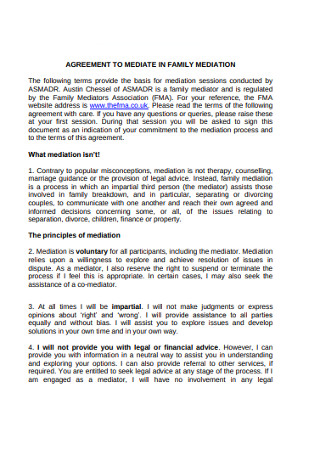
Family Mediation Agreement
download now -
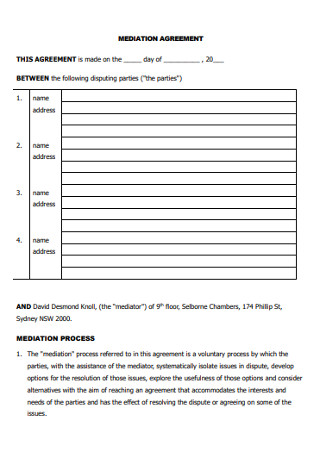
Formal Mediation Agreement
download now -
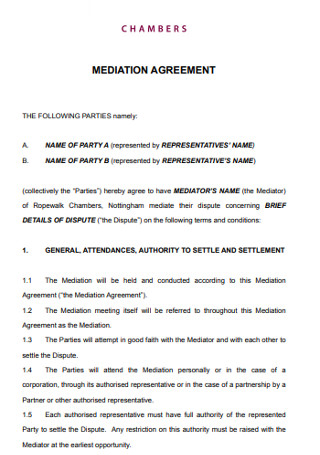
Chamber Mediation Agreement
download now -
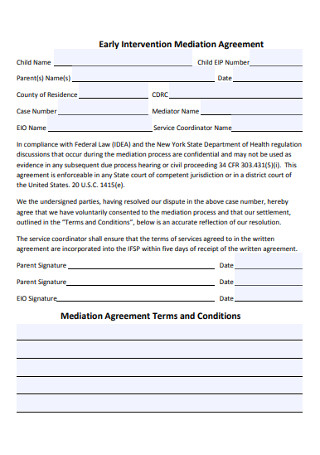
Early Intervention Mediation Agreement
download now -
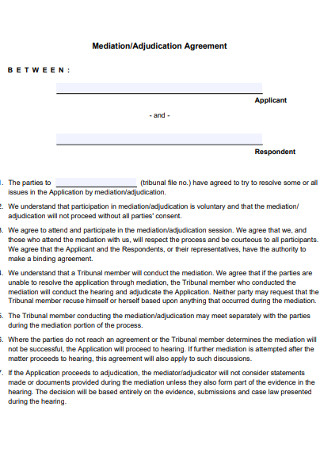
Mediation and Adjudication Agreement
download now -
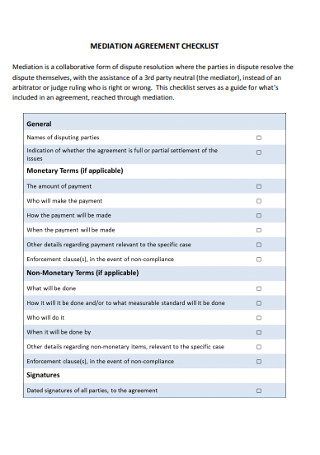
Mediation Agreement Checklist
download now -
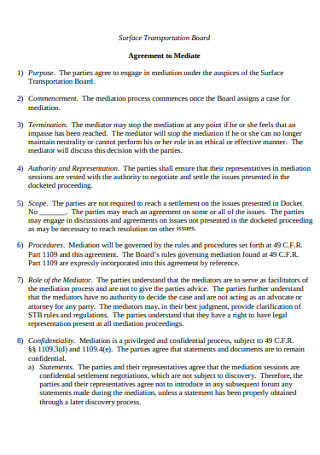
Transport Mediation Agreement
download now -
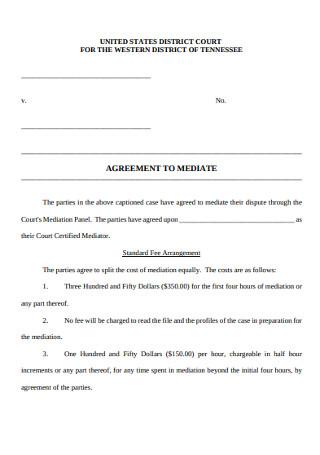
Distric Court Mediation Agreement
download now -
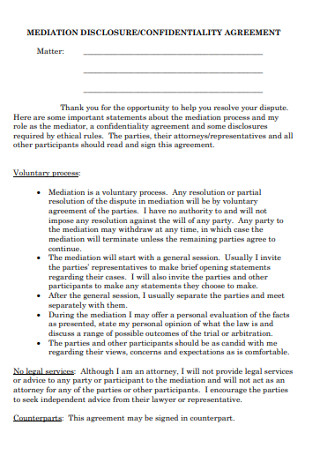
Mediation Disclosure Agreement
download now -
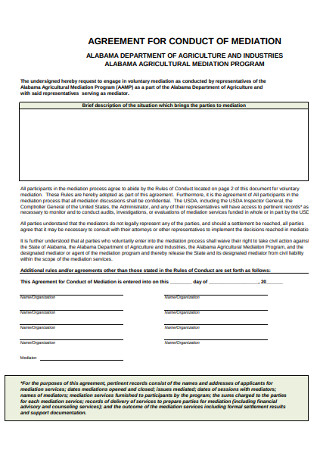
Agreement for Conduct of Mediation
download now -
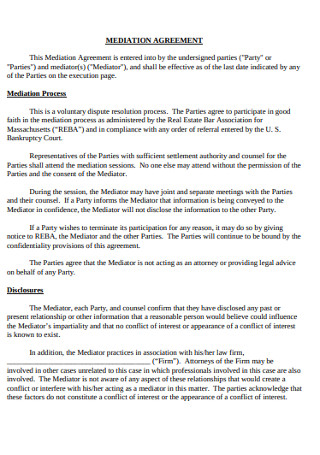
Simple Mediation Agreement
download now -
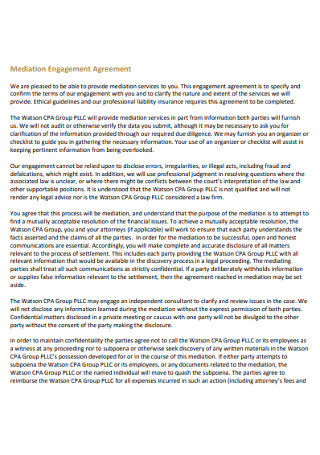
Mediation Engagement Agreement
download now -
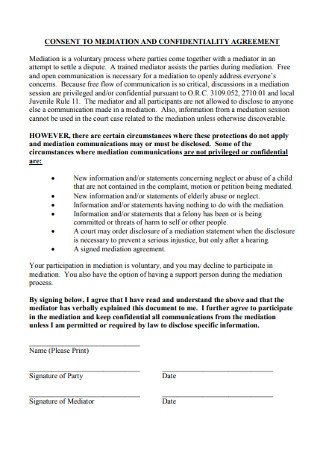
Consent to Mediation Confidentiality Agreement
download now -
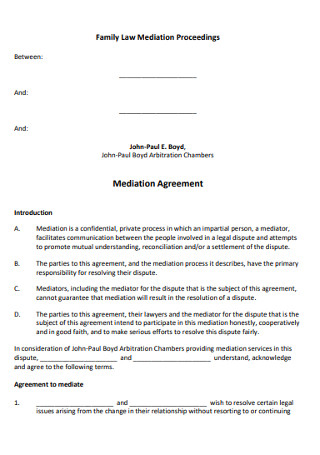
Family Law Mediation Agreement
download now -
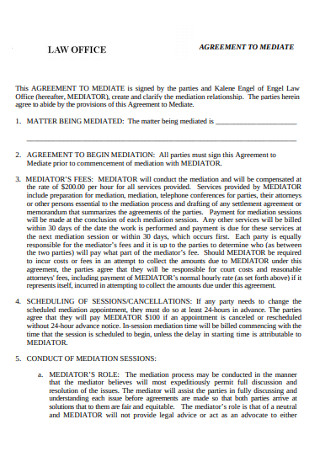
Mediation Law Office Agreement
download now -
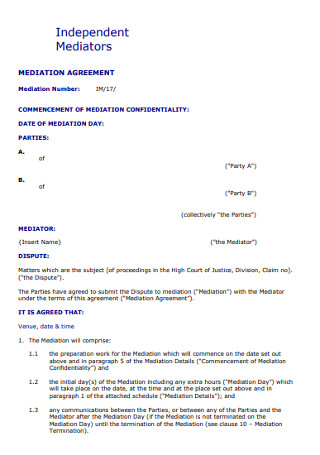
Independent Mediation Agreement
download now -
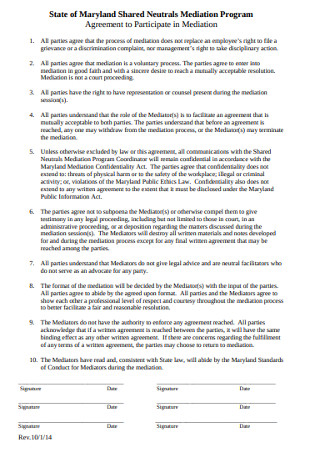
Agreement to Participate in Mediation
download now -
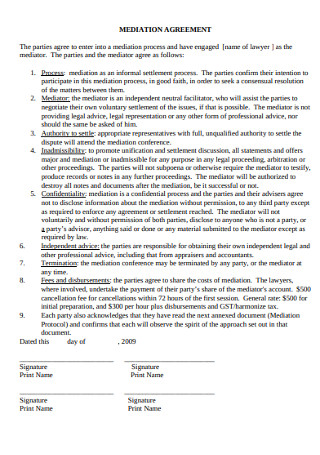
Mediation Agreement Format
download now -
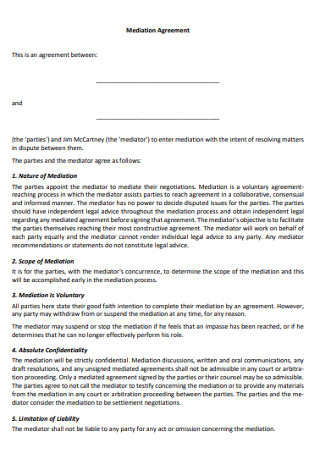
Nature of Mediation Agreement
download now -
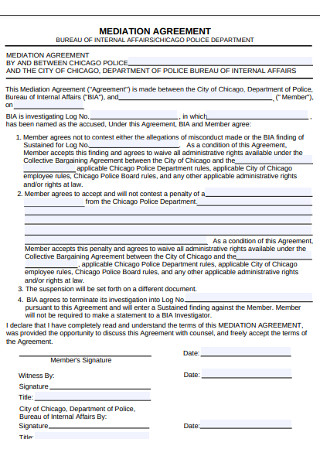
Police Department Mediation Agreement
download now -
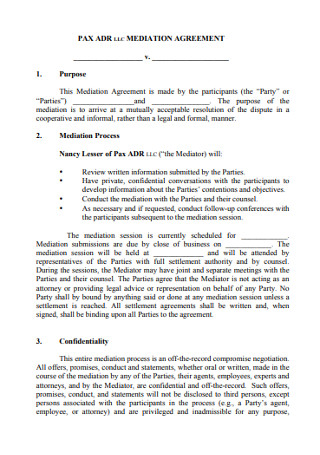
Mediation Service Agreement
download now -
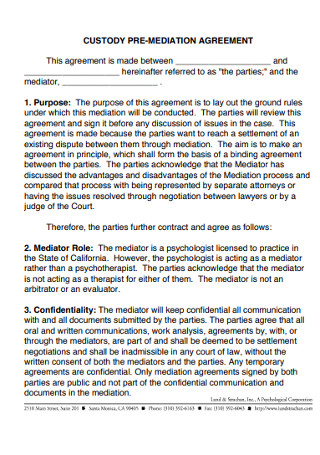
Custody Pre Mediation Agreement
download now -
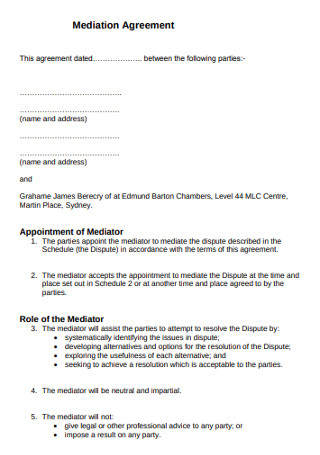
Sample Mediation Agreement Template
download now -
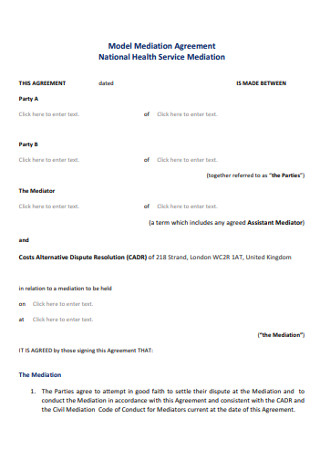
Health Service Mediation Agreement
download now -
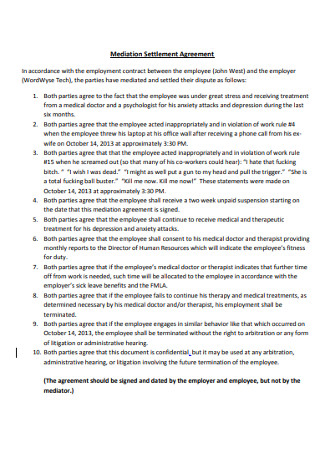
Sample Mediation Settlement Agreement
download now -
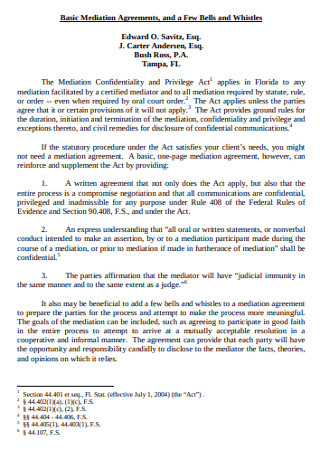
Mediation Agreements and Few Bells and Whistles
download now -
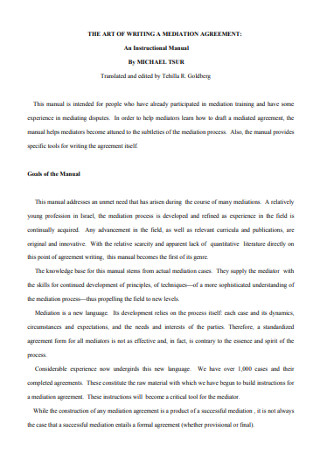
Art of Writing Mediation Agreement
download now -
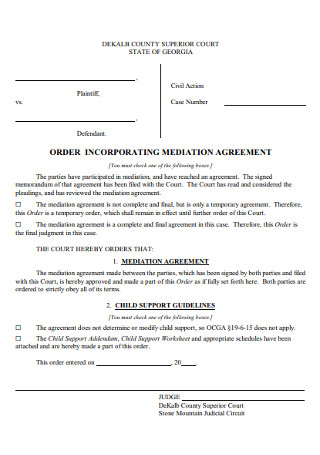
Incorporating Mediation Agreement
download now -
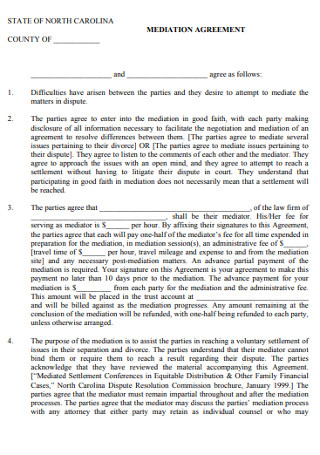
Printable Mediation Agreement
download now -
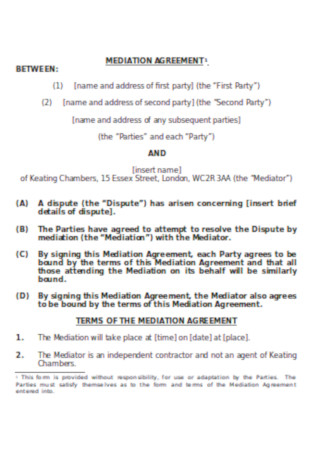
Sample Meditation Agreement Template
download now
FREE Mediation Agreement s to Download
45+ Sample Mediation Agreements
What Is A Mediation Agreement?
The Six Stages Of A Mediation Process
How To Successfully Write a Mediation Agreement
FAQs
What can I expect at a mediation hearing?
Do I need a lawyer to represent me in mediation proceedings?
Do I need to testify in a mediation hearing?
What happens when mediation does not work?
Can I appeal a mediation agreement?
What Is A Mediation Agreement?
Engaging the services of a lawyer is not cheap. You have to pay for acceptance, appearance, and retainer fees. Court fees are another set of expenses. Having to pocket out a significant amount of money is not the only thing that will stress you out. If you have previously experienced going through the court process, you know how emotionally and physically draining it can be. A typical court proceeding can last from a few months to a few years. Luckily, there are alternative dispute mechanisms available such as mediation. Mediation is an arrangement where two disputing parties appoint the service of a third person to act as a mediator. The mediator facilitates the negotiation proceedings between the disputants. He does not decide the case but instead helps the parties come to an agreement. The agreement reached is called a mediation agreement.
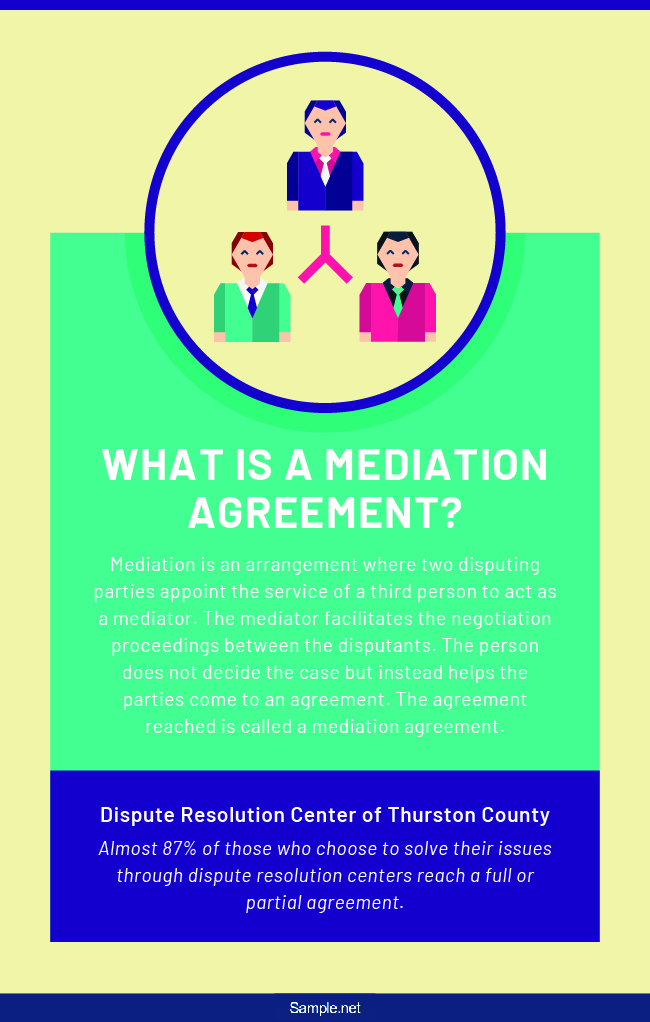
The Six Stages Of A Mediation Process
Instead of having to pay for costly court litigation, more people are choosing to have their disputes settled through mediation. Statistics provide that 87% of those who chose to solve their issues in Dispute Resolution Centers reach a full or partial agreement. Approximately 99% of them recommend mediation to others. If you’re wondering how it works, here is what to expect when going through mediation proceedings:
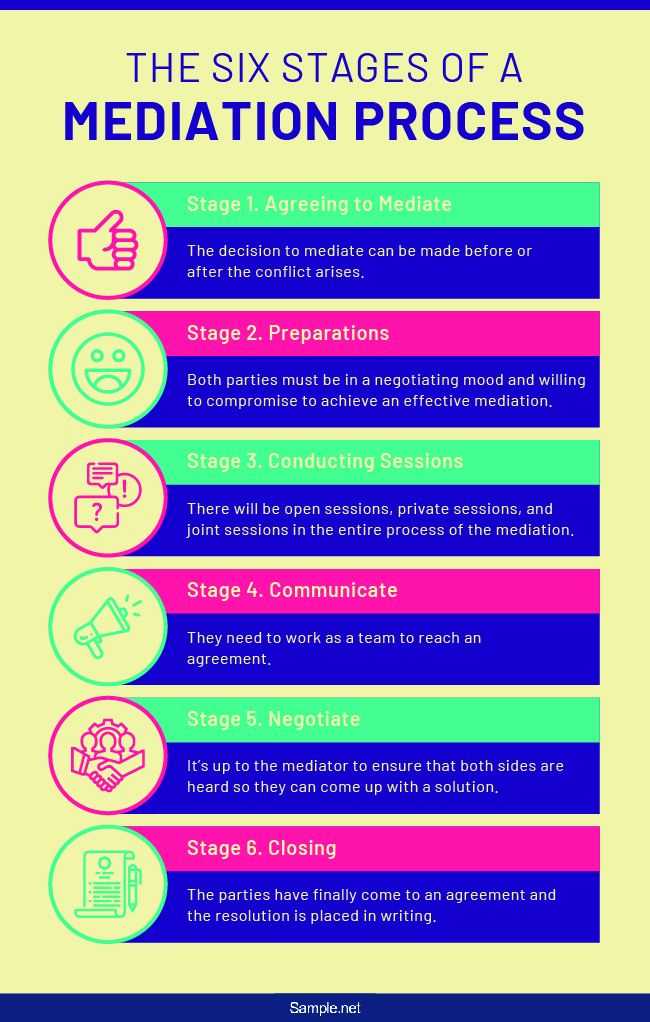
How To Successfully Write a Mediation Agreement
We can resolve many cases through reasonable discussion and negotiation. To achieve this, the parties in a dispute must be willing to compromise before deciding to enter into mediation. The burden to reach an agreement does not rest on the mediator, but on the parties themselves. As a mediator, your main task is not to decide but to aid the parties in reaching an agreement and to reduce it to writing. To help you write the mediation agreement, here are some steps you can follow.
Step 1: Identify and Name the Parties
A mediation proceeding is usually private. Only the parties in the dispute, their consultants, and the designated mediator take part in the hearing. As the mediator, you will formally give the opening statement and clarify the identity of the disputants. The disputing parties can be an individual for mediations dealing with family conflicts or a business entity for business disputes. Identification of the parties is done by signing their full names or business name in the written agreement. In addition, you need to make sure to clarify the authority of the representing individual in the case of business entities since it is usually a company employee who will represent them. It is paramount that you inquire into the scope of his authority, whether he can make binding decisions for his company. Otherwise, the whole mediation proceeding and the agreement will be non-binding.
Step 2: Present a Framework
Organization is key when solving problems. Having a framework will help you easily identify the main points of the conflict. Hence, it is important to introduce it at the very beginning. Make sure that all the parties agree on it. It is crucial for parties to be comfortable throughout the mediation process to encourage participation. Keep it simple, short and to the point. Directly identify what issue needs resolving and focus all efforts in reaching a settlement.
Step 3: Identify the Issues and Rank by Importance
To save you time, effort, and resources, it’s best to keep priorities in line. Rank issues by its importance. You can establish momentum if you first address the most difficult and complex points. Creating an outline will aid you to not overlook any issues discussed during the mediation process. The mediation agreement should cover everything agreed on and should contain the mutually decided solutions.
Step 4: Provide a Draft of the Agreement
Being able to produce a draft signifies progress. After a few bumps of heated confrontations and emotional turmoil, the parties are willing to compromise and ultimately terminate the dispute hearing process. All there’s left to do is write a draft of the agreement and present it to the parties for confirmation or revisions. A good tip to avoid further conflicts is to first read the draft to each party separately. When there are no objections, schedule another meeting and read the draft for a second time with both parties present. You should confirm with the disputants if they fully, without reservations, understood and affirm the contents of the draft agreement. A mediation agreement is by nature a contract. For a contract to be binding on all parties, there must be a meeting of the mind. Hence, the disputants must agree on the contents of the draft agreement to become final.
Step 5: Introduce Revisions
If either party finds the draft mediation agreement unsatisfactory, he can address his or her issues to the mediator and have the agreement revised. In this process, you will have to conduct minor meetings of a clarificatory nature to resolve the concerns. Constant revisions to the mediation agreement are necessary to fully reflect the interests and intentions of the disputants. The draft agreement should be flexible and will be subject to changes until it is final.
Step 6: Have the Final Agreement Signed
Signing the written mediation agreement signifies not only the closure of the dispute but also the legal status of the agreement. Once the party signs it, it becomes a binding document and the parties must honor their commitment. Since it involves legal matters, a party may choose to engage the service of a lawyer prior to signing the final agreement. This ensures that the agreement is not violating the law or their legal rights.
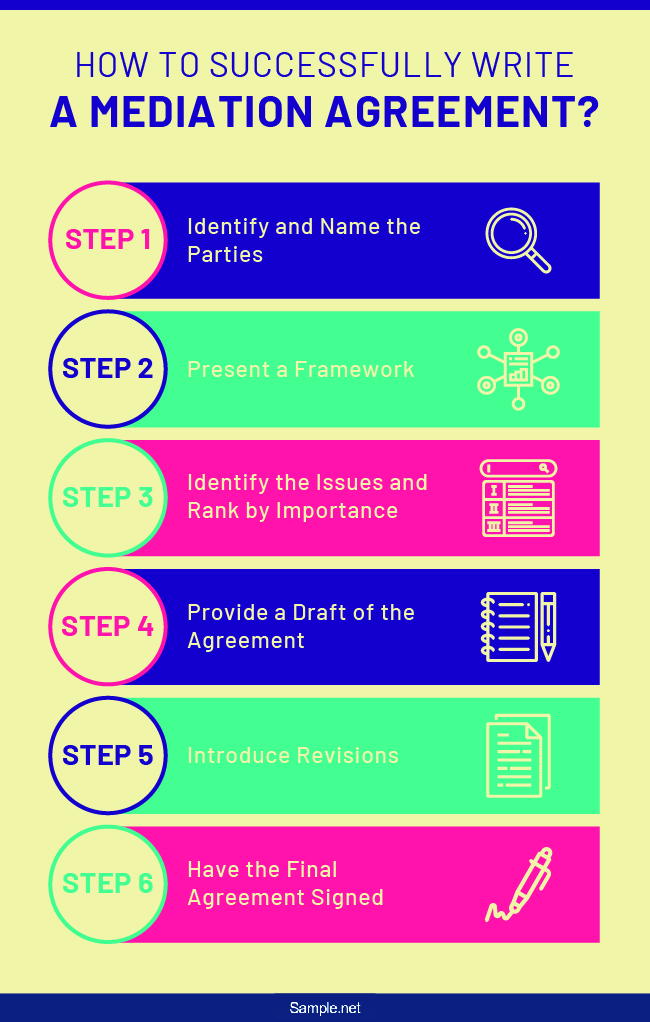
FAQs
What can I expect at a mediation hearing?
It will be quite similar to a meeting. You and the other party will be in a room, together with a chosen mediator. The purpose of conducting the meeting is to reach conciliation between the parties, so expect to compromise. The whole proceeding involves a “give and take” process which will enable the parties to agree on a negotiated settlement. Expect to make reasonable and fair concessions.
Do I need a lawyer to represent me in mediation proceedings?
The proceeding does not require the presence of a lawyer, but you can still hire the services of one as a consultant to offer you legal advice for the duration of the mediation. Hiring an attorney as a consultant is significantly cheaper than hiring him to litigate your case.
Do I need to testify in a mediation hearing?
No, you don’t need to testify in a mediation hearing. The proceeding follows a discussion format. Hence, you only need to communicate, explain, and negotiate. The purpose of conducting mediation is to reach a mutual agreement on a dispute, so there will be listening and participating during hearing sessions. There is no need for witnesses and testimonial evidence, you will only be discussing the facts of the case and providing explanations for each side.
What happens when mediation does not work?
If no agreement is reached during the mediation, you can choose to go to court and have a judge resolve the dispute. Resorting to mediation first does not mean you gave up your right to court litigation. If you choose to settle the issue in court, prepare to pay additional litigation expenses such as hiring a lawyer and paying court fees.
Can I appeal a mediation agreement?
Unfortunately, you cannot appeal a mediation agreement. An appeal can only be made to court decisions where there is a presiding judge. Unlike court cases, it is the parties to the mediation that decide on the resolution and not the mediator. The mediator is there to facilitate the meeting, not to act as a judge.
Unlike court-ordered decisions where the resolution ultimately sides with one party, mediation agreements provide a win-win solution for both parties. The process of negotiation in mediation allows them to successfully reach mutually agreed terms beneficial to both of them. Hence, mediation agreements have growing popularity and are great alternatives for costly court suits. If you’re in the process of writing one and don’t know how you can browse through our collection of sample mediation agreement templates to help you get started.
